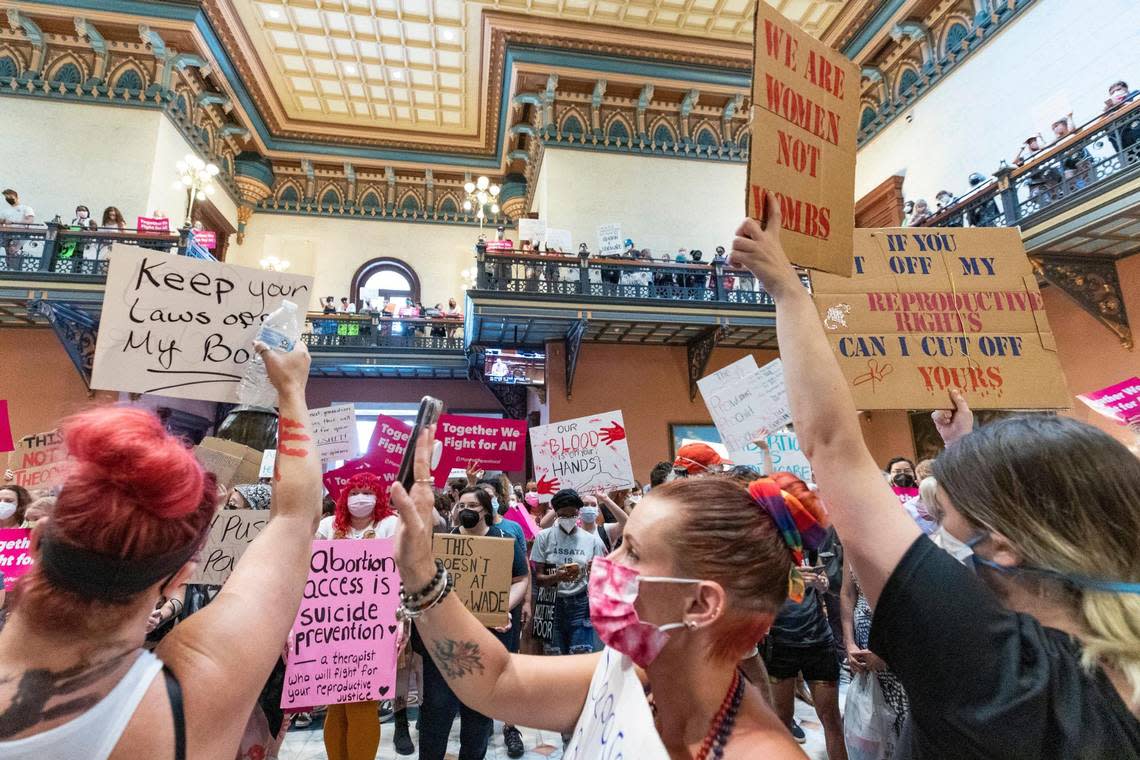SC’s 6-week abortion ban can now take effect after judge ends temporary block
South Carolina’s six-week abortion ban is now in effect after a federal judge stayed an injunction on the books for more than a year.
The order followed the U.S. Supreme Court decision to overrule its 1973 decision Roe v. Wade, sending the power back to the states to decide whether to restrict legal access to abortion.
South Carolina Attorney General Alan Wilson announced the order late Monday, which showed federal Judge Mary Geiger Lewis stayed an injunction that was blocking the state law, often called a “fetal heartbeat” abortion ban, from taking effect.
“The Heartbeat Law is now in effect. Once Roe v. Wade was overturned by the Supreme Court, the decision on legally protecting the lives of unborn babies was returned to the states, so there was no longer any basis for blocking South Carolina’s Heartbeat Law,” Wilson said in a statement. “Our state is now carrying out a government’s most sacred and fundamental duty, protecting life.”
On Tuesday, more than 200 people packed the State House’s second floor lobby to protest anti-abortion legislation and the overturn of Roe v. Wade as the Legislature met to take up the governor’s vetoes. The Tuesday protest, which overwhelmed the number of anti-abortion protesters, was organized by the Women’s Rights and Empowerment Network and Planned Parenthood South Atlantic.
“I’ve been sad and angry. I’m mostly angry,” Wendy Harbrot, a 48-year-old public school teacher, told The State. “Mostly for my daughter and for the students I teach, who are mostly minorities. This is gonna affect them the most. So, I’ve actually cried a lot.”
Gov. Henry McMaster signed the state’s six-week abortion ban into law last year, but it was immediately challenged and blocked by a federal judge. He applauded the announcement Monday, tweeting, “countless unborn children will be saved because of this law.”
McMaster told reporters Tuesday that he looks forward to the day when South Carolinians don’t have a need to get an abortion. He added that the six-week law, which includes exceptions — rape, incest, the life of the mother, or if the fetus has a fatal anomaly — is an “excellent” bill.
“I think we need to be very careful and realize that we must stop abortions in the country,” McMaster said. “So, we’ll see what the Legislature does, but I think we have to have a very firm line in South Carolina.”
When asked about his stance on exceptions, McMaster reiterated that he hopes abortions will not be necessary in the future and that the prospect of exceptions is in the hands of the Legislature.
State law now requires doctors to perform ultrasounds to check for fetal cardiac activity, typically detected at around six weeks of pregnancy — when most women don’t know they are pregnant, critics argue.
It also includes a fine and two-year maximum prison sentence for any doctor who performs an illegal abortion.
The future of abortion access in SC
South Carolina legislators could further restrict abortion rights this year.
A House committee created by Speaker Murrell Smith, R-Sumter, plans to meet after July to take public input and draft legislation that is likely to restrict access to abortions. Senate leaders have indicated they plan to do the same.
Neither chambers have released details about when respective committees will meet.
In a statement Monday, Jenny Black, president and CEO of Planned Parenthood South Atlantic, said the “fight is far from over.”
Planned Parenthood, one of several plaintiffs in the case, has two locations in South Carolina, one in Columbia and one in Charleston. Greenville Women’s Clinic also performs abortion procedures.
“Planned Parenthood South Atlantic’s doors are open in Charleston and Columbia. We are providing abortion care in full compliance with Senate Bill 1, and we encourage anyone seeking an abortion to contact our office,” Black said. “After last week’s harmful Supreme Court ruling overturning Roe v. Wade, it’s clear that the best path to protect abortion access in South Carolina after around six weeks of pregnancy does not run through our existing federal court case.”
Lizzie Grosso, a 22-year-old photographer who attended the “Pack the Lobby” protest, said the Legislature did not take the time to listen to constituents when it passed the six-week abortion bill. Grosso said it’s important to allow for accessible abortion laws because lives could be at risk.
“I have been fighting for this since before I could even vote,” Grosso told The State. “This is just an issue that is just really important to me and people I care about, because I do know people who have had to have abortions for even life-saving procedures.”
At least one person was taken into custody during Tuesday’s protest, seen by reporters yelling at protesters and police.


